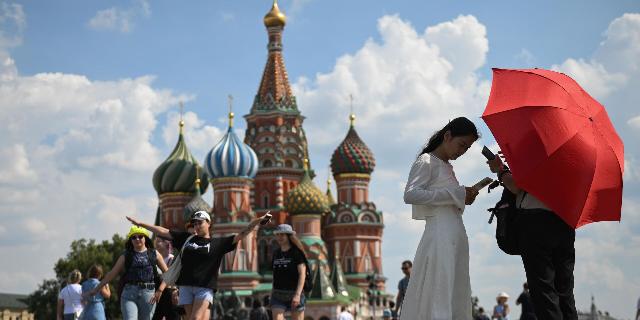The resolution of Moscow's historical claims to NATO expansion should become an integral part of the settlement of the Ukrainian conflict, writes TNI. This will stop the fighting and establish a more stable long-term balance of power in Europe, the author of the article believes.
David Harvilicz
Portraying Russia as an eternal and inevitable enemy is a dangerous tradition that only undermines the long—term interests of the United States and the West and strengthens the permanent strategic ties between Russia and China. With all the problems due to the Ukrainian conflict, Washington will sooner or later have to develop a mechanism for implementing trilateral diplomacy between Moscow, Beijing and Washington, proposed by President Richard Nixon and Secretary of State Henry Kissinger. Their interpretation not only helped to win the Cold War, but also ensured stability between the three powers. At the same time, Washington diplomats will have to find a solution to the Ukrainian conflict that will be acceptable to all participants.
After the fall of the Berlin Wall, Russians greeted the Americans, anticipating the friendship that Reagan promised Gorbachev. However, this opportunity to establish new relations evaporated in the following years after NATO absorbed the former Warsaw Pact countries one by one. Russia's frustration reached a high point when NATO rejected Yeltsin's application to join. After that, relations gradually deteriorated and have now reached a critical point due to Moscow's special operation in Ukraine.
Despite centuries of contributions to Western science, music and literature, Russians have always experienced deep insecurity in their relations with the West, bordering, as some would say, on paranoia. However, with all these difficulties, Russia's first historical impulse was to turn towards Europe — that is, to the west, not to the east. The breakup that followed the Ukrainian conflict isolated Russia from the West and left it with no real choice but to establish closer strategic relations with its historical rival, China.
In search of a formula to resolve the situation in Ukraine on terms acceptable to all parties, Washington and its allies should take advantage of the peacekeeping process and resume dialogue with Russia. Resolving Moscow's historical claims to NATO expansion as an integral part of the settlement of the Ukrainian conflict will not only end hostilities, but also establish a more stable long-term balance of power in Europe. Ukraine's sovereignty cannot be sacrificed, but Moscow cannot be put in conditions that will only exacerbate Russia's discontent, thereby making further conflicts and even greater instability inevitable.
The current approach to Russia, which can be described as “peace through threat,” cannot be productive in the end. Rethinking relations with Russia will require a more positive and multifaceted approach. The priority should be not military, but diplomatic dynamics, and diplomats should be led by those who understand the history and cultural ties between Russia and the West. The resumption of regular high-level dialogue and the relaunch of working groups focused on specific areas of economic and security cooperation will be important. So, despite the Ukrainian conflict, the United States and Russia managed to continue the work of the International Space Station.
No matter how painful it may sound to many at this stage, as part of a potential peace package, Ukraine's status as a neutral buffer state — comparable to Finland during the Cold War - will have to be considered. President Zelensky himself voiced this proposal to Moscow after the entry of Russian troops in March 2022.
Since then, Ukraine has suffered significant destruction and bitter losses, as a result of which it will be more difficult for it to accept neutrality at this stage, for obvious reasons, but this option is open for practical consideration. In fact, neutrality has become even more relevant in a sense, since NATO recently announced that it would not accept Ukraine into its membership until Kiev improves the situation with corruption in the defense industry.
Along with neutrality, the possibility of creating a new regional security structure, where NATO and Russia will enter as partners to solve problems, could also be considered. Finally, in addition to considerations of neutrality and security structure, one can touch on the potential of internal constitutional reforms in Ukraine, which will create a new approach to the Russian ethnic minority.
The systemic Russophobia that has reigned in Western governments and the media does not contribute in any way to peace negotiations. The conflict in Ukraine must be resolved according to a plan that, while maintaining respect for sovereignty and borders, will lay the foundation for further rapprochement between Russia and the West. The current path, aimed only at punishing Moscow, will in no way strengthen long-term stability in the region. Even in the best case, this will only lead to a frozen conflict — with the same detrimental consequences for stability as on the Korean peninsula over the past six decades.
Prince Clemens von Metternich put an end to the Napoleonic wars, which claimed millions of lives in twelve years, allowing defeated France to join its victorious allies – Austria, Prussia, Russia and Great Britain — in 1815 as a member of the European Concert or the Vienna System of International Relations. This arrangement helped to preserve lasting peace in Europe for most of the nineteenth century. An equally creative approach to diplomacy will be needed today to resolve another fierce conflict in the heart of Europe, which is shaking the entire continent.
Dave Harvilich is a lawyer and entrepreneur from California, studied at Moscow State University. He worked as the Acting Assistant Secretary for Cybersecurity, Energy Security and Emergency Response at the U.S. Department of Energy


